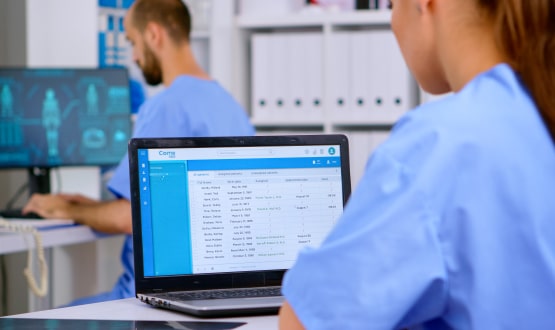£800m already spent on NPfIT in South
- 21 January 2010
The National Programme for IT in the NHS has spent £800m of taxpayers money in the South of England in seven years; or more than two-thirds of the original £1.2 billion contract value.
NHS papers obtained by E-Health Insider reveal that by September 2009 just £407m of the original allocation remained. Over the period, just eight NHS hospital trusts, or less than a fifth of the 43 acute trusts in the region, have received new electronic record systems.
The papers from NHS South Central state: “The move towards CRS (care records services) and the Clinical 5 in South Central has been severely hampered by termination of the Fujitsu LSP (local service provider) contract covering SPIT (the Southerm Programme for IT)”.
The newly published strategic health authority papers, which date from late 2009, reveal that huge sums of money have been eaten up by the termination of Fujitsu’s LSP contract in April 2007, and the subsequent high costs of making alternative arrangements.
These include the extremely high unplanned cost of ongoing support from Fujitsu for a two year interim period after its contract was axed. They also include the eventual award of a £500m contract to BT in April 2009.
Another costs have been the transfer of the PACS/RIS service from Fujitsu to CSC, providing more acute functionality, and bringing Surrey and Sussex hospitals back into the national programme.
Although two thirds of the South’s money has gone, bosses at NHS South Central believe a programme of NHS IT upgrades can be delivered with the remaining £400m.
A business case for a procurement of community and child health systems has been signed off by the three SHAs in the South and submitted for approval by the DH and Treasury, costed at £85m.
Work is also underway on a business case for IT systems covering the five ambulance services in the South, with an estimated price tag of £20-25m.
For acute care, work is underway to agree a common set of requirements and to assess the feasibility of using ASCC framework deals.
“Should volume demand be identified a business case will be developed for DH and Treasury approval" the papers say. “However, the cost has not yet been estimated."
Seperate business cases are being developed for a handful of so-called ‘greenfield’ sites with the ability to implement Cerner Millennium from the ground up, as long as they can find the extra money to pay for it.
Oxford Radcliffe Hospitals NHS Trust is envisaged to be one of a handful of greenfield sites in the South, with the one site predicted to cost almost £21m of local expenditure over the next four years.
Just £12.5m is budgeted for the development of Clinical 5 PAS functionality at all other acute trusts in South Central; £4.3m for electronic prescribing and £1.3m for order communications. For scheduling the figure is zero.
Other eye-catching budget lines are the cost of PACS/RIS, put at £25m in South Central alone. GP Systems of Choice is budgeted at £27m, with another £27m for RiO community implementations.
Over the next four years, to 2013-14, the SHA estimates that it faces an IT funding gap of £8m, based on total expenditure of £184m and total identified funding of £176m [all but £5m of it internal].
“The sector with the largest projected expenditure is acute, £76m, which also has the majority of the funding gap, £5m.” The health economy with the biggest expenditure, some £55m, is predicted to be Oxfordshire.
The papers also make clear that trusts must plan to pay for the ongoing running costs of nationally procured systems from 2015.
However, the SHA recognises that any new greenfield, community and ambulance procurements may be subject to ‘political’ risks.
“There is a risk that given the political timescales and actions (no new business cases being approved) associated with a General Election, the central machinery may stop before the business cases are approved.
"From a South Central perspective this could mean the loss of access to circa £30m centralised funding.”
Take-up of some nationally procured systems in community and mental health is described as “considerable”.
This is contrasted with the situation in the acute sector, which “is very reliant on local patient administration systems and local departmental systems that can be integrated through the deployment of a local integration engine."
Given this heavy reliance on legacy systems, NHS South Central concludes: “Some of the trusts may consider using the ASCC route to attract central funding for clinical departmental systems and the integration engine.”
Overall the mood is upbeat. The board papers state: “There is increasing confidence that the demand for centrally funded systems can be met from the TCV allocation.
"Although the approvals process is not without risk there is an expectation that these can be managed through existing relationships and governance arrangements.”




